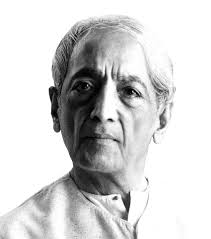Krishnamurti
Time is chronological and psychological, outward and inward. And conflict arises when time is introduced into our lives as `I will be’, `I not be’, `I must arrive’, `I must fulfill’. And if the mind could eliminate all that process, then we might find that the mind is no longer measurable, has no frontier, and yet can live in this world totally, completely, with all its senses.
For most of us, chronological time as today, tomorrow and yesterday is essential. Time is involved in learning a technique, to earn a livelihood. It is there, and you cannot avoid it; it is a reality.
Now, is there any other time at all, as a fact? Or has the mind invented psychological time as a means of achievement, as a means of becoming something? I am envious, acquisitive, brutal; but, given time, I will gradually be free from envy, be non-violent. Is that a reality, is it a fact, as the distance from London to Paris is a fact? Is there any other fact as definite and real as space and distance?
In other words, is there psychological time at all? Though we have invented it, though we live with it, though it is a fact to us, is there such a thing? We accept chronological time and we also accept psychological time; and these two, we say, are facts. The one, the chronological time, is a fact; but I am questioning whether the other is a fact.
Is time necessary in order to see something clearly, immediately? To see acquisitiveness, envy, all the things, the suffering involved in envy, to see the truth of it, is time necessary? Or does the mind invent psychological time in order to enjoy the fruits of envy and avoid the pain of it? So, time may be the refuge of an indolent mind.
It is the lazy mind that says: `I cannot see the thing immediately, give me time, let me look at it for a longer period; later I will do something about it’, or `I know I am violent; and gradually, when it no longer pleases me, when it is no longer profitable to me, when I am no longer enjoying it, I will give it up’. Therefore the ideal is born: the idea of `what should be’ is placed at a distance, away from the fact of `what is’.
So there is a gap between `the fact’ and `what should be’. And I am asking: is the ideal, the `what should be’, a fact? Or is it a convenient invention of the mind to enable it to carry on with the pleasures and pains, the indolence of postponement?
So to see something immediately – the absurdity of envy, of competition, of social morality –does not require time.
Excerpted from Public Talk 9 London, England – 21 May 1961. The 33rd death anniversary of J. Krishnamurti will be observed on February 17







